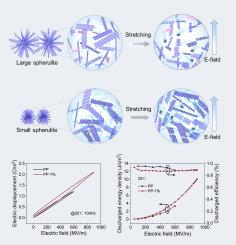Crystal refinement in biaxially stretched capacitor films for enhanced energy storage
IF 13.2
1区 工程技术
Q1 ENGINEERING, CHEMICAL
引用次数: 0
Abstract
Polymer-based film capacitors are essential energy storage components in high-power electric devices. Biaxial stretching is a scalable, high-throughput technique widely used for this film fabrication, yet the impact of crystalline structure evolution during stretching on capacitive performance remains insufficiently understood. Here, we report a crystallization regulation strategy by tailoring the initial crystal size in polypropylene through the incorporation of tiny nucleating agent. This approach refines the crystalline morphology of pre-stretched PP sheets and governs subsequent structural evolution during biaxial stretching. A critical grain size threshold of 5.4 μm is identified, beyond which crystal fragmentation and excessive free volume emerge, leading to elevated leakage currents and premature dielectric breakdown. By maintaining crystal sizes below the threshold, crystal fragmentation is suppressed and microstructural integrity preserved, enabling reduced interfacial defects and restrained electron migration. The resulting films simultaneously exhibit enhanced mechanical robustness and dielectric reliability with a record breakdown strength of 958 MV/m and an exceptional discharged energy density of 10.2 J/cm3. This insight redefines the design paradigm from traditional crystallinity enhancement toward precise crystal-size control for optimized dielectric performance. Coupled with low material cost and scalable processability, this crystallization regulation strategy offers a promising route toward next-generation, industrial-scale polymer-based energy storage films.

用于增强能量存储的双轴拉伸电容器薄膜的晶体细化
聚合物薄膜电容器是大功率电子器件中必不可少的储能元件。双轴拉伸是一种可扩展的、高通量的技术,广泛用于这种薄膜的制造,然而,在拉伸过程中晶体结构的演变对电容性能的影响仍然没有得到充分的了解。在这里,我们报告了一种结晶调节策略,通过加入微小的成核剂来调整聚丙烯的初始晶体尺寸。这种方法改进了预拉伸PP片材的结晶形态,并在双轴拉伸过程中控制了随后的结构演变。在5.4 μm的临界晶粒尺寸阈值范围内,晶体破碎和自由体积过大,导致泄漏电流增大和介质过早击穿。通过将晶体尺寸保持在阈值以下,可以抑制晶体破碎并保持微观结构的完整性,从而减少界面缺陷并抑制电子迁移。所得到的薄膜同时表现出增强的机械鲁棒性和介电可靠性,击穿强度达到创纪录的958 MV/m,放电能量密度达到10.2 J/cm3。这一见解重新定义了设计范式,从传统的结晶性增强到精确的晶体尺寸控制,以优化介电性能。再加上低材料成本和可扩展的可加工性,这种结晶调节策略为下一代工业规模的聚合物储能薄膜提供了一条有前途的途径。
本文章由计算机程序翻译,如有差异,请以英文原文为准。
求助全文
约1分钟内获得全文
求助全文
来源期刊

Chemical Engineering Journal
工程技术-工程:化工
CiteScore
21.70
自引率
9.30%
发文量
6781
审稿时长
2.4 months
期刊介绍:
The Chemical Engineering Journal is an international research journal that invites contributions of original and novel fundamental research. It aims to provide an international platform for presenting original fundamental research, interpretative reviews, and discussions on new developments in chemical engineering. The journal welcomes papers that describe novel theory and its practical application, as well as those that demonstrate the transfer of techniques from other disciplines. It also welcomes reports on carefully conducted experimental work that is soundly interpreted. The main focus of the journal is on original and rigorous research results that have broad significance. The Catalysis section within the Chemical Engineering Journal focuses specifically on Experimental and Theoretical studies in the fields of heterogeneous catalysis, molecular catalysis, and biocatalysis. These studies have industrial impact on various sectors such as chemicals, energy, materials, foods, healthcare, and environmental protection.
 求助内容:
求助内容: 应助结果提醒方式:
应助结果提醒方式:


